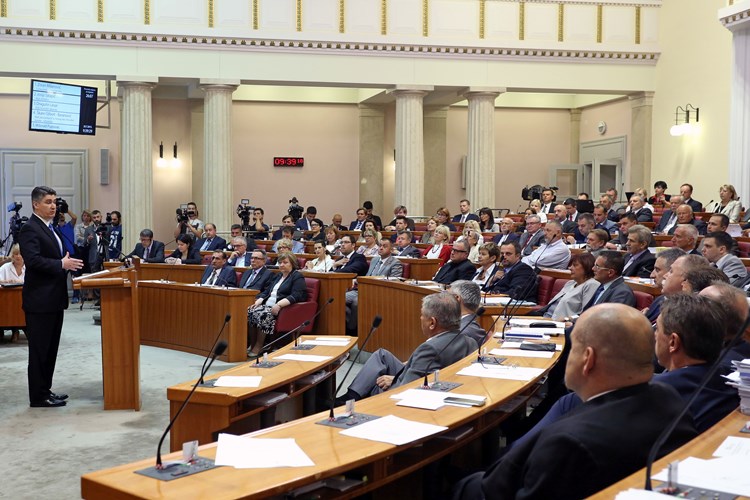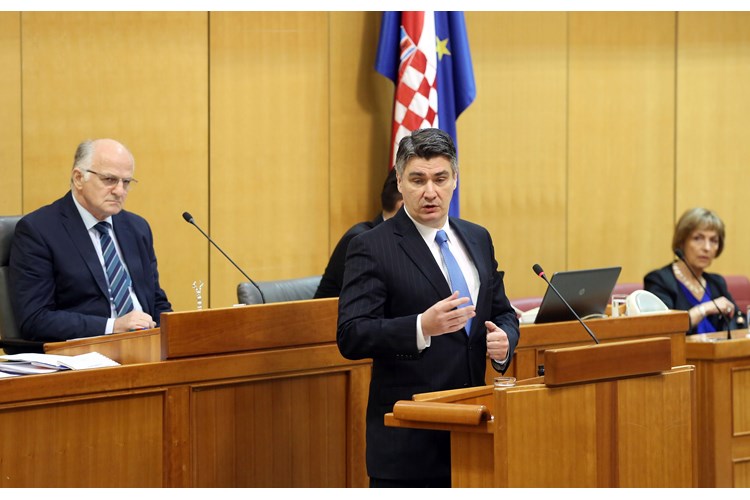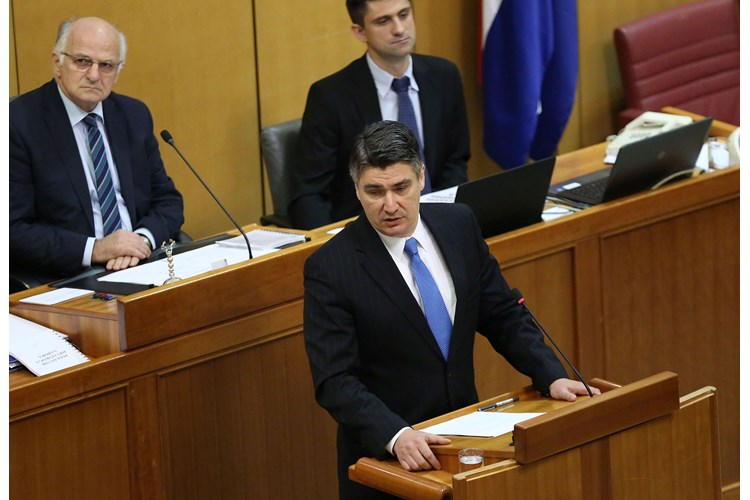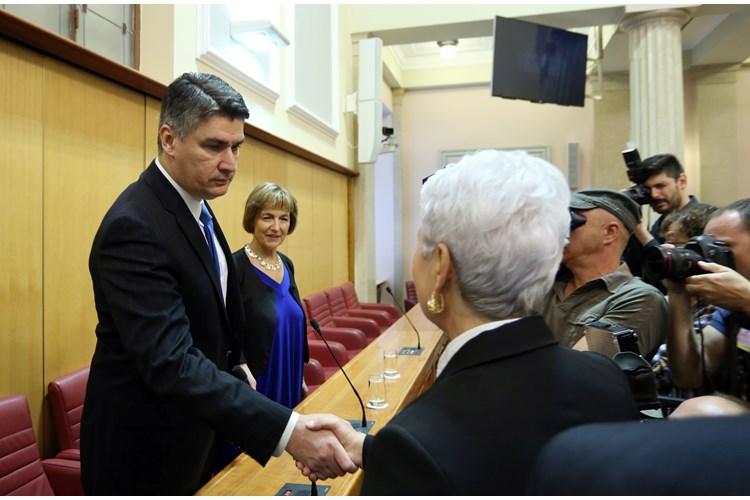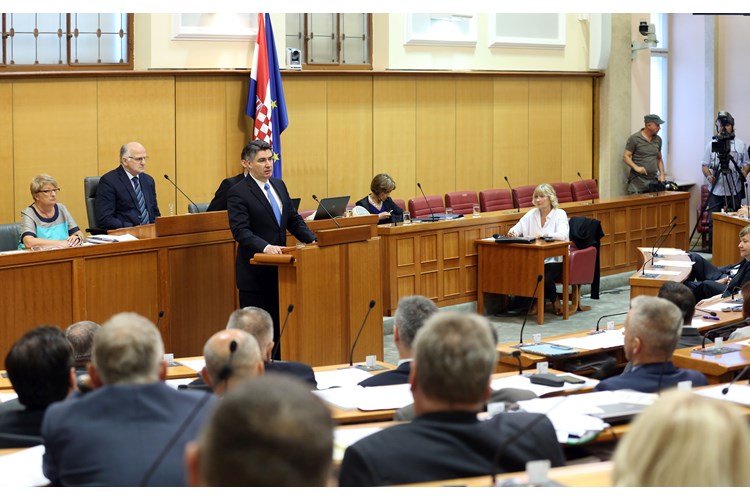- Published: 29.07.2015.
Prime Minister Milanovic: Croatia cannot dissolve Arbitral Tribunal but can withdraw
Croatia cannot dissolve the Arbitral Tribunal but it can withdraw from the arbitration proceedings, Prime Minister Milanovic said at the start of an extraordinary session of parliament, convened to discuss a gov't proposal for Croatia's withdrawal from the border arbitration with Slovenia.
"A mistrial has occurred, such a procedural error after which the proceedings cannot continue. What are we to do? We've got to get out," Milanovic said.
The government put forward a proposal under which it would be bound by parliament to launch a procedure for the termination of the arbitration agreement between Croatia and Slovenia, signed in Stockholm on November 4, 2009, because of a substantial violation of its provisions by Slovenia.
A scandal broke out last Wednesday when the Zagreb-based Vecernji List daily published transcripts revealing that a Slovenian judge sitting on the arbitration tribunal and a Slovenian Foreign Ministry official had secretly discussed the case and lobbied other judges to influence the outcome of the arbitration in Slovenia's favour.
According to the transcript of a conversation between Judge Jernej Sekolec and Foreign Ministry official Simona Drenik, the arbitration tribunal would have awarded most of the disputed Bay of Savudrija, known in Slovenia as the Bay of Piran, to Slovenia. The two officials have in the meantime resigned.
"We've got to get out. Whether the Arbitral Tribunal will continue its work or not, we have nothing to do with it anymore. The tribunal may continue to work, but we won't recognise any of its decisions," the Croatian prime minister said.
Milanovic said that Croatia had not violated the agreement. "We have played by the rules and we will continue doing so," he added.
Milanovic said that the scandal had compromised the very model of arbitration. "Croatia has no border agreements with anyone other than Hungary. After this, who will agree to arbitration?" he wondered.
Transcript of Prime minister's opening remarks:
Dear Mr. Speaker, dear colleagues members of parliament, following a meeting with chairmen and representatives of all parliamentary clubs, we have assembled today to reach a conclusion – with your agreement and support – by which the Parliament would oblige the Government, in accordance with the Standing Orders of the Parliament, to do something that it has the possibility and the right to do. But the point of this session of the Parliament is to get an additional political confirmation and accentuation of that decision by the Parliament. We will appreciate such support and it indeed means a lot to us.
After that, the Government, i.e. the governmental bodies, and the relevant ministry, shall implement the procedure of treaty termination, i.e. treaty renunciation and leaving the treaty, in accordance with our law and general international law and the Vienna Convention. We will not be wrong whichever term we use here. Treaty termination due to its material breach.
I emphasize the word “treaty”, i.e. “agreement”, this is all the same, an Arbitration Agreement between the Republic of Croatia and the Republic of Slovenia, parties of which are our two states. By virtue of that Treaty, and I was taught to use that term years ago, although formally it is called “an agreement”, the establishment of one pertinent arbitration body is envisaged, i.e. the Arbitral Tribunal. After its establishment, that body was to continue with its work and life as more or less an independent body, which was to reach a decision on the boundary. That is how it was supposed to be.
Even today, six years since its signing, I consider the Arbitration Agreement to be decent and I do not think it was harmful to Croatian interests. At that point, some matters needed clarification. You will recall that at that point I used the term “constructive abstention” and I insisted on that term when together with my party colleagues in the SDP I decided to assume responsibility and support the Agreement. I also went to Brussels to see Commission President – at that point, it was Mr. Barroso, and Mr. Rehn was also there, and Mr. Neven Mimica and myself went there – and insist – though it may sound too presumptuous to use that word – but I asked the President of the Commission to persuade me that he knows and that he is aware that the Agreement contains a provision which stipulates that he, as Commission President, or another person in that capacity, once the Agreement was ripe, produces a list of arbitrators from which it was then upon Croatia and Slovenia to select the arbitrators.
Few years later, we had no trouble reaching agreement on the arbitrators and the arbitration, i.e. the Arbitral Tribunal started with its work. As usual, the problem was not the document, as for me the document was, from the perspective of Croatian national interests, not bad, it was sustainable. The problem was, as usual, in the people. The people failed the trust and we have to leave this treaty.
The Arbitration Agreement envisaged, i.e. it mandated the Tribunal in a few directions. The first and the most important one was the determination of the interstate boundary at land and at sea between the two republics. To this procedure the Tribunal was to apply international law, i.e. the same source which is predominantly used also by the International Court of Justice, which was at that time also our priority which we did not manage to achieve because of the other side’s categorical insistence on arbitration. As it usually is the case in politics, in which all or at least most of us distinguish the good and the bad, this was a matter of choosing between a less and a more unfavorable option.
We chose a less unfavorable option compared to the optimal option which we could not get.
But, this is now behind us, things happened which brought us to a point of no return. Something happened which – I apologize for using foreign words – but in some legal systems, it is called “a misstrial”, i.e. such an error in the proceedings that the procedure cannot continue. This is like influencing or coercing members of the jury in American law. At that point, the proceedings terminate.
This is what happened. Unfortunately, this is what happened and we all feel uncomfortable because of this. What is the worst, or perhaps, the best, depending on the point of view, those who took part in those events admitted it.
What shall we do? We have to get out. According to the rules of international law, there is a procedure and we have to abide by it as we have thus far followed the procedure and procedural ethics.
The name of the Croatian arbitrator was often mentioned here, but I call upon you not to even use that word. There is no “Croatian arbitrator”. There is a person with a name and a surname, who has a name as he does. I will depersonalize him completely. This is a person who was my professor and more than a professor, my mentor, as he was to quite a few other people who still serve Croatia and fight for Croatian interests and have been doing so for the past 25 years. With that person none of us were in any kind of contact, least so in a not allowed form of contact.
When we talk about whether Croatia shall withdraw its arbitrator, two things are worth mentioning. First, Croatia does not have its arbitrator. Each arbitrator has his own duties, responsibilities and must abide by the same ethical code of conduct.
When he becomes member of the arbitration, he is no longer a Croat, nor a Slovene or a Frenchman, he is an arbitrator. The same applies to the arbitrator which was nominated by the Republic of Croatia three and a half years ago. Will he withdraw from the process himself? It is up to him. If he does, good, if he does not, he may by doing so prove that he is entirely independent. But we have nothing to prove here. Everything has been proven already.
We cannot cancel the Arbitral Tribunal as such, it is a pertinence of the Agreement, but what we can do is leave the Agreement because we are a state. Whether the Arbitral Tribunal continues with its work or not, we no longer have anything to do with it.
According to general rules, i.e. according to the Vienna Convention, Slovenia has a deadline of a few months to express its views on our notification of treaty termination, i.e. its cessation of validity and Croatia’s exit from the treaty because of material breach of its provisions, and I think everything is clear to everyone here. To those to whom it is not yet clear, it shall soon be very clear.
Do not find anything threating in these words, least so towards the Republic of Slovenia. And I call upon you today to maintain a level of dignity and posture in the debate, so this would in no way be interpreted as an interstate feudal estate, i.e. a conflict between Croatia and Slovenia. This is merely a material violation for which one party bears the responsibility, and this is now beyond repair, as far as Croatia is concerned.
Therefore, the procedure is clear. Let me repeat it again. After the Parliament supports, if the Parliament supports – I hope with a clear majority or unanimously, but let me not prejudice anything – the Government, i.e. mandates the Government – in a way which is legally stronger than the law itself – to act in a certain way, to begin the procedure of termination, exit, ending the treaty, as the draft here already suggests, I will be most precise, the termination of agreement with all its consequences, the Government shall in its session tomorrow, the Government would in its session tomorrow adopt a decision, not a ruling – this in the Parliament is a ruling – the Government would adopt a decision by virtue of which, as mandated by the Parliament, the procedure of treaty termination would be instigated and the relevant ministry, in this case the Ministry of Foreign and European Affairs, would be assigned to implement this procedure. Dixi! As far as we are concerned, this puts an end to this story at this point.
What the other side will do, there is no point to discuss this now. It will probably do what it will consider to be in its best interest at that point.
These are matters between Croatia and Slovenia. The EU acted as facilitator here, some would say the godfather, but the baby was born, it had its path of development and at one point, became very deviant and we must reeducate it. Sadly, that is the case.
I propose to Slovenia that we agree on a new model. Slovenia is a friendly neighboring state with which we have a lot in common and with which we are about to share even more over the coming years of common worries and challenges in controlling European borders, in which respect I believe Croatia will assume a greater role of a frontrunner. But, all we can do is to propose, there is no force here and we cannot force it to happen.
This model has been definitely compromised, but not only in this case. This has left a stain on the model as such. With this knowledge and this experience, who will ever in the future give such trust, such absolute trust, to arbitration? This is the kind of trust in which sub spe you anticipate someone’s decision on something as important as the state boundary, so that it practically seems as you yourself gave up on it.
However, our move will show that we did not give up on behaving as a sovereign state, to the extent necessary and to the extent to which it is possible to be sovereign at this point, conscious of itself, protecting its interests, but not to the expense and the damage of others’ interests.
This does not mean that Croatia turned its back to resolving the issue of the boundary. No. As we said on a number of occasions these days, we practically do not have a boundary agreement... Not practically, we do not have it with any country except with Hungary. Even if that is not a problem, it is certainly not good. We do not have a boundary agreement with Slovenia, nor with Bosnia and Herzegovina, nor with Serbia, we do not have it. We should have it.
After this, who will agree to arbitration? Who will give their trust? So after this, I believe the policy of each Croatian Government will be to insist on the International Court of Justice, i.e. on international law, on codified international law, which is predominant, if not the only dominant source of law of such courts. This – I no longer know what it is.
I am content that these days there were no raised voices from Ljubljana. There were none from Zagreb. I hope there will be none today, either. We have to follow our own path, not a path of adventure, but a path of stability, a path of predictability. We are a member of the EU, we are a member of NATO, we have good development prospects and we are the masters of our own destiny. This is no deep prophecy, but a mere fact which everyone in Croatia is today aware of, and on which we have to work together. Collectiveness, unity and unanimity are not at the heart of democratic politics, they are an exception. Because when everyone speaks, thinks and acts the same way, then very soon one starts thinking on behalf of everyone. Therefore, politics is, socially speaking, a polarizing job and calling.
It is good that we are in agreement about these issues. If there are any proposals, or corrections so as to perfect this ruling of the Parliament, although we [prepared it] yesterday in the afternoon after the Government adopted an act proposing this ruling to the Parliament for adoption after a debate, in short and in brief, I ask you to leave it is as it is. Because this is clear, strikingly clear and permeating. So, what is it upon the Government to do? To get the job done. After that, pursuant to general rules which are in fact of international nature, it goes into the procedure and does that. As things stand now with this mandate which the Parliament would give to the Government, there is no need for any Government to come back to the Parliament. It only needs to do what the Parliament ordered it to do in accordance with the Parliament’s Standing Orders. With its rulings, the Parliament orders, i.e. mandates the Government what to do. This is the case at hand.
This is what I had to say as a matter of introduction. In your debates, I ask you again to be – I do not know how to say this so it would not seem as if I am lecturing – watchful of every word. What happened – happened, we need to get out of this clean. We played by the rules, we will play by the rules onwards because we are such a team. Thank you very much and I thank you in advance. For the remainder of the day, I and the Croatian Government shall be represented here by the First Deputy Prime Minister and Minister of Foreign and European Affairs Vesna Pusić. Thank you for your understanding.”
(Text and photo: Hina)
